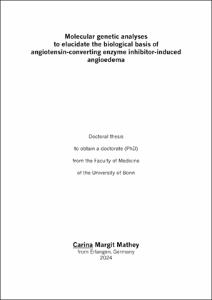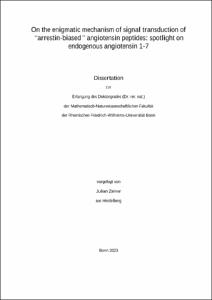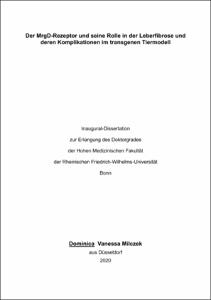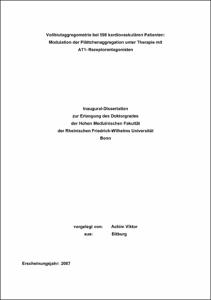Molecular genetic analyses to elucidate the biological basis of angiotensin-converting enzyme inhibitor-induced angioedema

Molecular genetic analyses to elucidate the biological basis of angiotensin-converting enzyme inhibitor-induced angioedema

| dc.contributor.advisor | Nöthen, Markus M. | |
| dc.contributor.author | Mathey, Carina Margit | |
| dc.date.accessioned | 2024-02-27T13:57:57Z | |
| dc.date.available | 2024-02-27T13:57:57Z | |
| dc.date.issued | 27.02.2024 | |
| dc.identifier.uri | https://hdl.handle.net/20.500.11811/11352 | |
| dc.description.abstract | Angioedema is a rare, potentially life-threatening adverse reaction to angiotensin-converting enzyme inhibitors (ACEi) and angiotensin-II-receptor blockers (ARB), two commonly prescribed drug classes with an indication in antihypertensive therapy. Like hereditary angioedema (HAE), angioedema induced by an ACEi (ACEi-AE) or ARB (ARB-AE) is mediated by bradykinin and thus non-allergic in nature. Findings from previous research suggest that individual susceptibility to ACEi/ARB-AE is shaped by a genetic predisposition and non-genetic risk factors. Several non-genetic risk factors have been reported and include for example, female sex, smoking and a history of seasonal allergies. In addition, recent genetic studies have identified the first genetic loci involved in ACEi/ARB-AE susceptibility. However, understanding of the exact pathophysiology remains limited.
To further elucidate the genetic factors underlying ACEi/ARB-AE risk, this dissertation employed two strategies: (i) exploration of the potential involvement of pathogenic HAE-associated variants and genes, and (ii) genome-wide investigation of the contribution of common variants. As groundwork for the abovementioned genetic studies, the vARIANCE study, the largest case collection of German/Austrian ACEi/ARB-AE patients to date, encompassing genetic material and comprehensive phenotypic data, was established. The first study was based on the observation that the most recently discovered HAE subtypes with normal C1-inhibtor levels share certain clinical features with ACEi/ARB-AE, raising the possibility of an inaccurate diagnosis. To investigate this and to determine whether the genetic factors involved might converge in the same genes, targeted re-sequencing of five then-known HAE-associated genes (SERPING1, F12, PLG, ANGPT1, and KNG1) was performed in a large cohort of 197 ACEi/ARB-AE patients. The study revealed that none of the patients carried a known causal HAE variant. In addition, no other common or rare variant in these five genes showed a significant association with ACEi/ARB-AE. These findings suggest that an underlying pathogenic HAE-associated variant in patients initially diagnosed with ACEi/ARB-AE is infrequent at best. The second study addressed the contribution of common variants by the means of a large-scale genome-wide association study meta-analysis that included, for the first time, more than 1,000 ACEi-AE patients. Three genome-wide significant loci were identified, including a novel risk locus on chromosome 20q11.22. The other two loci mapped to 1q24.2 and 14q32.2 and are consistent with two loci previously reported with exome- and genome-wide significance. Integrative secondary analyses highlighted previously reported genes (BDKRB2, F5) and biologically plausible novel candidate genes (PROCR, EDEM2). Cross-ancestry analyses involving European and African-American individuals revealed shared common variants with concordant effect directions and sizes, in particular at the three genome-wide significant risk loci. As such, the present findings indicate an involvement of bradykinin signaling, coagulation and fibrinolysis pathways in ACEi-AE pathophysiology. Interestingly, two of the three identified risk loci corresponded to loci associated with venous thromboembolism, an observation that should be further investigated in future studies. In addition, preliminary evidence suggested the relevance of the three genome-wide significant loci across different ancestries, thus underscoring their role in the pathophysiology of this adverse drug reaction. In conclusion, the present dissertation contributed considerably to the further understanding of the genetic background of ACEi/ARB-AE and provided important groundwork for future research in this field, not least via the establishment of a deeply phenotyped cohort of ACEi/ARB-AE patients (vARIANCE study). | en |
| dc.language.iso | eng | |
| dc.rights | Namensnennung 4.0 International | |
| dc.rights.uri | http://creativecommons.org/licenses/by/4.0/ | |
| dc.subject | Angioödem | |
| dc.subject | Angiotensin-Converting Enzyme Inhibitor-induziertes Angioödem | |
| dc.subject | ACE-Inhibitor | |
| dc.subject | Angiotensin-II-Rezeptor Blocker | |
| dc.subject | Hereditäres Angioödem | |
| dc.subject | Genetik | |
| dc.subject | Pharmakogenomik | |
| dc.subject | Kandidatengen Studie | |
| dc.subject | Genom-weite Assoziationsstudie | |
| dc.subject | Meta-Analyse | |
| dc.subject | angioedema | |
| dc.subject | angiotensin-converting enzyme inhibitor-induced angioedema | |
| dc.subject | angiotensin-II-receptor blocker | |
| dc.subject | hereditary angioedema | |
| dc.subject | genetics | |
| dc.subject | pharmacogenomics | |
| dc.subject | candidate-gene study | |
| dc.subject | genome-wide association study | |
| dc.subject | meta-analysis | |
| dc.subject.ddc | 610 Medizin, Gesundheit | |
| dc.title | Molecular genetic analyses to elucidate the biological basis of angiotensin-converting enzyme inhibitor-induced angioedema | |
| dc.type | Dissertation oder Habilitation | |
| dc.publisher.name | Universitäts- und Landesbibliothek Bonn | |
| dc.publisher.location | Bonn | |
| dc.rights.accessRights | openAccess | |
| dc.identifier.urn | https://nbn-resolving.org/urn:nbn:de:hbz:5-74937 | |
| dc.relation.doi | https://doi.org/10.3389/fgene.2022.914376 | |
| dc.relation.doi | https://doi.org/10.1016/j.jaci.2023.11.921 | |
| ulbbn.pubtype | Erstveröffentlichung | |
| ulbbnediss.affiliation.name | Rheinische Friedrich-Wilhelms-Universität Bonn | |
| ulbbnediss.affiliation.location | Bonn | |
| ulbbnediss.thesis.level | Dissertation | |
| ulbbnediss.dissID | 7493 | |
| ulbbnediss.date.accepted | 19.02.2024 | |
| ulbbnediss.institute | Medizinische Fakultät / Institute : Institut für Humangenetik | |
| ulbbnediss.fakultaet | Medizinische Fakultät | |
| dc.contributor.coReferee | Cichon, Sven | |
| ulbbnediss.contributor.orcid | https://orcid.org/0009-0005-3484-3051 | |
| ulbbnediss.contributor.gnd | 1389080897 |
Dateien zu dieser Ressource
Das Dokument erscheint in:
-
E-Dissertationen (2137)







